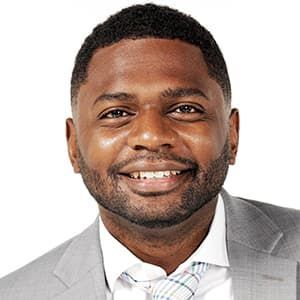
Every day across the country, the Feeding America network helps ensure our neighbors facing hunger have access to the food they need to thrive. And that work is amazing – but there’s more to do. If we want to end hunger, we have to address its root causes. We have to build relationships with communities disproportionately impacted by hunger, and we have to co-create equitable solutions, together with people with lived and living experience of hunger.
A new face at Feeding America is helping do just that. David Street was recently hired as the director of community engagement with a focus on Black communities. David will help lead the charge to address hunger among Black communities, which are more likely to experience hunger. We caught up with David to discuss his role, what he hopes to accomplish, and how Feeding America can make a difference in partnership with Black communities.
Tell me about yourself, and what in your life experience drew you to this opportunity?
I identify as Afro-Latino. My mom is a beautiful Black woman. My father emigrated here from El Salvador in the 1980’s when it was in the middle of a civil war. I come from these rich communities, but oftentimes these two communities are so marginalized and under resourced that it’s a tragedy. Seeing people deal with hunger and an education system that isn’t the best, or trying to figure out prices or just how to stay safe – that’s been my norm.
There is legislation, policies and systems in place that do a disservice to Black and Brown people, and that’s putting it mildly. That’s a true reality for myself, and for the neighbors we want to engage with. It’s something I’ve lived my entire life. If I’m going to be in a position where I have resources and connections, then I’d better be using them to uplift marginalized voices all over this country. People who do want a fair shot, who want good meals, who want to access resources and support, but who don’t want to be tokenized doing it, who want a seat at the table in an authentic manner.
What is Feeding America doing right now to address food insecurity in Black communities?
First, we are in coalition with partners all over the country when it comes to important pieces of legislation, like the farm bill, which touches everything from SNAP, WIC, Black farmers and more. So, when you think of marginalized people and safety net programs that can help, the Farm Bill is a particularly important piece of legislation. We know we can’t just food bank our way out of hunger, it’s going to take policies and programs that can help us do it.
Second, continuing to invest in community engagement – at a grassroots and grasstops level. The statement we’re making is saying, “we want to get really good at community outreach.” We want to be the best neighbor and friend of our food banks, our community partners and with the families we serve. And I’m excited that we can take that up a notch.
Speaking of taking things up a notch, what will you be working on in your position?
My role exists to help Feeding America do a couple of things. First, to help us become that better neighbor to all the groups and individuals that we work with all over the country in the anti-hunger space. And, to connect grass tops leaders to the various plans and strategies that we believe will help us end hunger. For example, from an advocacy standpoint, who are the organizations we need to work with to help the Farm Bill get across the finish line? Who are the organizations we need to listen to to ensure Black farmers and food banks have excellent relationships?
At the highest level, I’m making sure the right people are connecting with Feeding America to allow us to “punch above our weight class.” I want to help us open doors and more resources to the brilliance that is happening in the food space. When you look at what Black farmers are doing, and the AI and tech spaces – knowing that there are a lot of Black people who are leading in those spaces – how do we amplify their work and shine a light on them, so they can touch more people and be connected to food banks?
What are some challenges you foresee and how do you overcome those?
Apathy is real, so how do you keep people engaged and hold people accountable to ensure things continue to get done? And, when you are trying new things, you inevitably hit roadblocks and there is a tendency to say, “let’s just take it slow.” When, in fact, we should be moving fast. So, when that mentality comes up that can be a challenge – knowing when to press the gas. Right now, we need to press the gas. The work we are doing in the community engagement space is new for Feeding America. We are going to make mistakes; we are not going to get it right all the time. But, if we lead from an equitable lens and we are trying to be the best neighbors we can and lean into the best practices we know will work, we are going to be fine.
